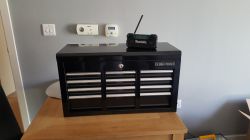Hello. I am going to make a table (2000 mm x 800 mm) for light work in a small home workshop. I wonder what to use for the table top, I wanted 24mm plywood, but it is much more expensive than, for example, OSB, I thought I could use OSB and thin plywood to make the surface smooth. I would love to see your tables. There will be nothing too heavy on the table, e.g. the box below and some basic tools.
I have just checked and 18 mm plywood is not so expensive, because PLN 218, would 18 mm be enough for such a table?

I have just checked and 18 mm plywood is not so expensive, because PLN 218, would 18 mm be enough for such a table?



